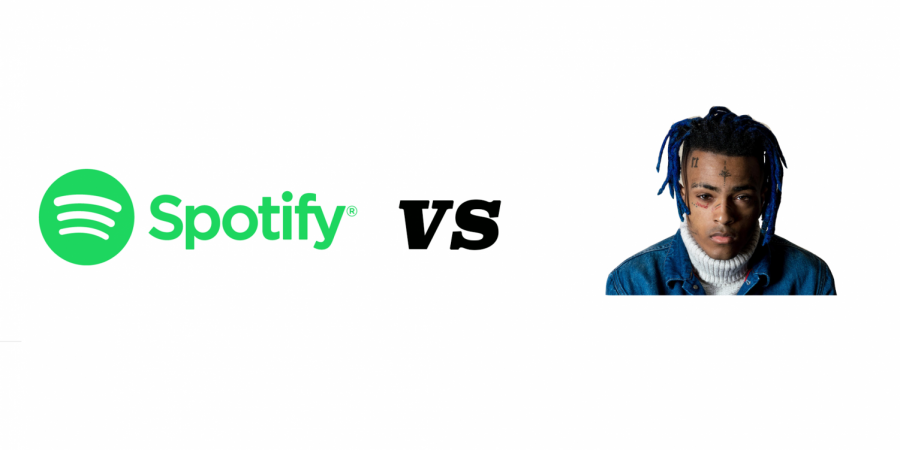Spotify Removes Artists’ From Its Playlists As Part of New Hate Content Policy
In light of recent negative press surrounding many different prominent artists, XXXTentacion, along with many others, has been affecting by their recent “Hate Content & Hateful Conduct” policy.
May 18, 2018
For the longest time— or forever— there has always been a conversation about musicians and their bad history of criminal actions or records. Do you still listen to their music, do you still support them, or will you stop listening to their music in regards to their behavior and abuse? This has definitely been up for discussion for a long time, and now that streaming services have dominated the music industry, that question has been floating around more than ever because of how easy it is to listen to any artists.
On May 10, Spotify enforced a new policy, the “Hate Content and Hateful Conduct.” It says that if an artist “expressly and principally promotes, advocates, or incites hatred or violence against a group or individual based on characteristics including race, religion, gender identity, sex, ethnicity, nationality, sexual orientation, veteran status, or disability,” that they will not promote this music.
This does not mean in any way that they will censor the artist or remove their music from their streaming service at all; all of the affected artists will remain. What this will do will remove their promoted songs on “operated playlists and algorithmic recommendations such as ‘Discover Weekly’,” but most notably songs on the “Rap Caviar” playlist, which has almost 10 million followers.
As far as right now, only three artists have been affected: R. Kelly, Tay-K, and XXXTentacion. Both of these artists have been convicted with pretty disgusting allegations, such as R. Kelly marrying a 15-year-old girl in a secret ceremony in 1994, being involved in trapping six women in a “sex cult;” XXXTentacion with allegations of beating a pregnant woman; and Tay-K being tried for capital murder charges. All of these are just touching the tip of the iceberg in terms of allegations that these artists have.
This leads to a huge discussion: “what about other artists?” Clearly, as Spotify stated, the reason for this new policy is that they “don’t censor content because of an artist’s or creator’s behavior, but we want our editorial decisions — what we choose to program — to reflect our values.”
So if that is the case, there are a lot of other artists to take off these promoted playlists. This could be labeled as “whataboutism,” but the case still remains that if they are going to be enforcing this new policy, that they need to be way more consistent with this. There are a number of artists out there that have committed actual crimes, not even allegations, and this rule — as of now — is not enforced towards them.
Here are some artists that have serious allegations or crimes against them:
- Dr. Dre
- 2Pac
- Chris Brown
- Nas
- Red Hot Chili Peppers
- 6ix9ine
- Ozzy Osbourne
- John Lennon
- Michael Jackson
- David Bowie
- Kodak Black
- Famous Dex
- NBA YoungBoy
- And many more.
These questions are ones that Spotify should be asking themselves because if they want the music they promote to reflect their own values, they need to decide reputably who they remove and who they don’t.
All in all, I think that this decision that Spotify made will cause a stir of controversy for a few days until it settles down because at the end of the day it was a decision that they wanted to make, and it doesn’t remove said artists from Spotify itself.
In light of these decisions by Spotify, we have to ask ourselves where we as listeners separate morals and music. Do we continue to listen to artists such as XXXTentacion regardless of his horrid allegations, or will we stop and will we make our own choices on who we listen to? Should we be separating the art from the artist, or do we put a certain standard on music and judge the art and the artist in one package? This can be a tough decision for anybody that wants to put this kind of standard on who they listen to because at some point you have to ask yourself, ”where do I draw the line?”







Robert b ◊ Nov 29, 2021 at 6:06 am
Did they remove jeff dunham in this? I loved listening to him but then everything was gone. I hate it
Jeff Dunham ◊ Jun 1, 2018 at 9:50 am
Yung Bratz
Andrew Coviello ◊ May 29, 2018 at 1:23 pm
Spotify is just another corporation.
Spotify doesn’t care about your rights.
Spotify doesn’t care about your favorite artist.
Spotify doesn’t care about you.
Jack Miller ◊ May 20, 2018 at 7:36 pm
It’s so unfair that they are doing this, literally so many others need to be removed then. Dumb policy.